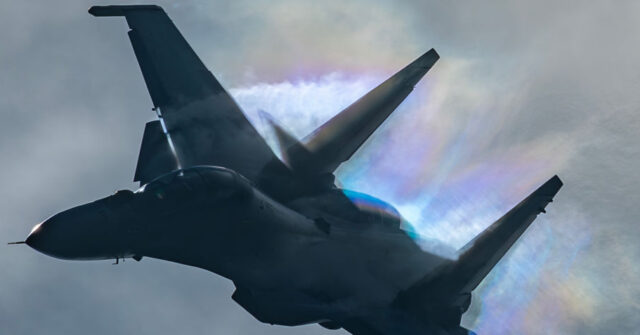Lithuania has complained of a Russian incursion into its airspace of a pair of jets leaving Kaliningrad, the latest such violation in an apparently rising pace of events in recent weeks.
Two aircraft — a jet fighter and an aerial refuelling tanker jet — were intercepted by NATO Eurofighter Typhoons on the verge of Lithuanian airspace on Thursday. The interception comes amid discussion between NATO partners on how to deal with the rising pace of violations of the alliance’s airspace, including by manned jets and by drones.
The President of Lithuania Gitanas Nausėda made a statement on the jets in which he said he strongly condemned the flights. He called them a “crude violation of international law and the territorial sovereignty of Lithuania” and stated “we have to react to this”.
Decrying a “blatant breach” of international law, the Nausėda also called for a strengthening of European air defence. The establishment of what has been called a ‘European Drone Wall’ has been much discussed in recent weeks, shorthand for a unified European air-defence system capable of dealing with the low-intensity, asymmetric threats being put into the air by Russia in an apparent bid to test European resolve.
The plan is not without its critics. The German Defence Minister Boris Pistorius warned this week that obsession over drones could distract European states from greater threats, like air defence against jets. He told The Times: “A rock-solid drone wall that can never be penetrated is not realistic”.
On the matter of jets, the exact circumstances under which Russian aircraft could be shot down by NATO nations if they stray into alliance airspace — an extremely serious matter, considering the potential ramifications — has been the currency for discussion in European circles for weeks. This follows the actual shooting down of a series of large Russian drones over Poland last month.
Clarifying the position in remarks in Washington D.C. this week, NATO Secretary General Mark Rutte said it was, of course, possible for Russian jets to be shot down but unless they were posing a direct threat, they would be intercepted and escorted away instead.
Mr Rutte said: This is not new, this happened in the Soviet days, it now also happens under President Putin. It’s got to stop, but NATO has reacted, and it is necessary — and let me make the point again, because there was some misunderstanding the last people of weeks. If necessary, NATO can take down these planes if they pose a threat. If they do not post a threat they will be intercepted and gently be guided outside [NATO] airspace.
While the rhetoric on incursions from some NATO member states has been hot headed, to say the least, with Poland accusing Russia of deliberate attacks, Rutte took a more cautious tone. Crucially, he said of those recent drone and jet flights: “As far as we can establish it was not intentional, but it was anyway reckless and unacceptable.”
Read the full article here
